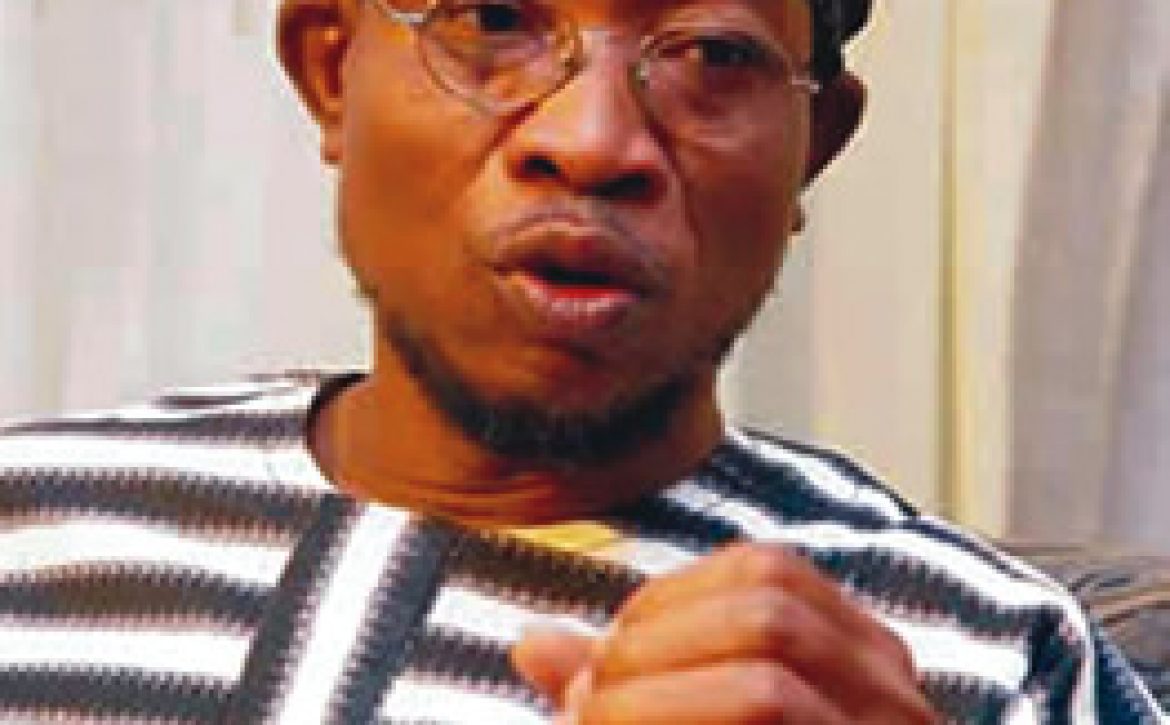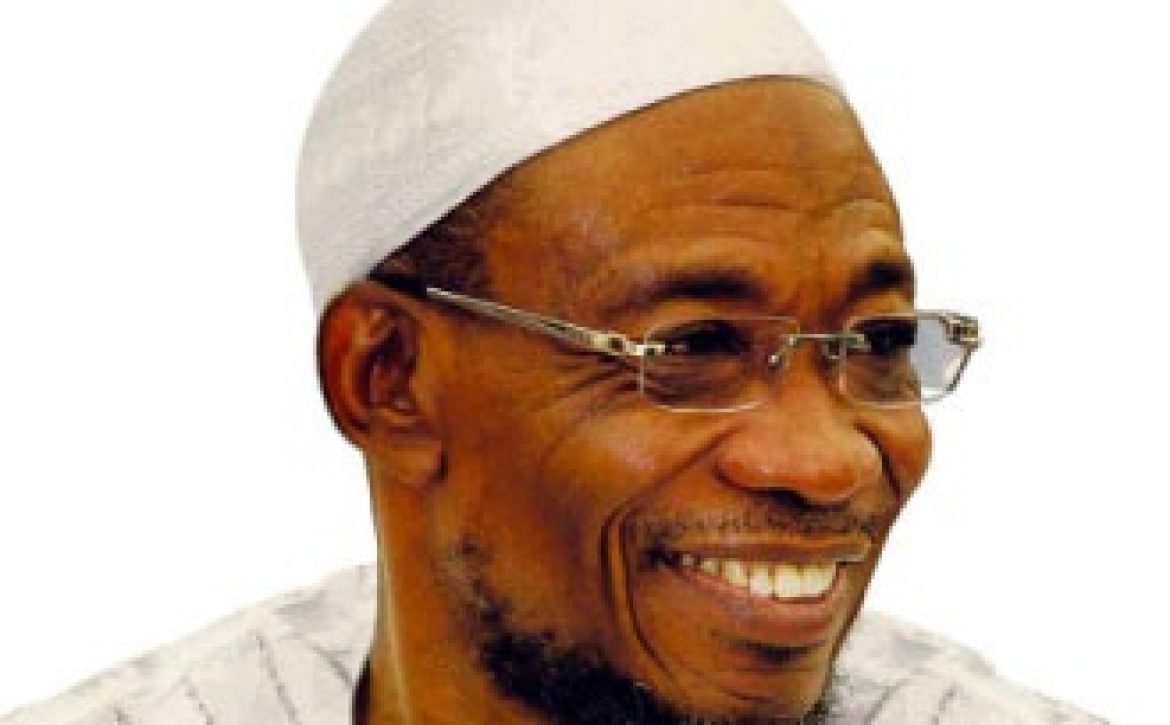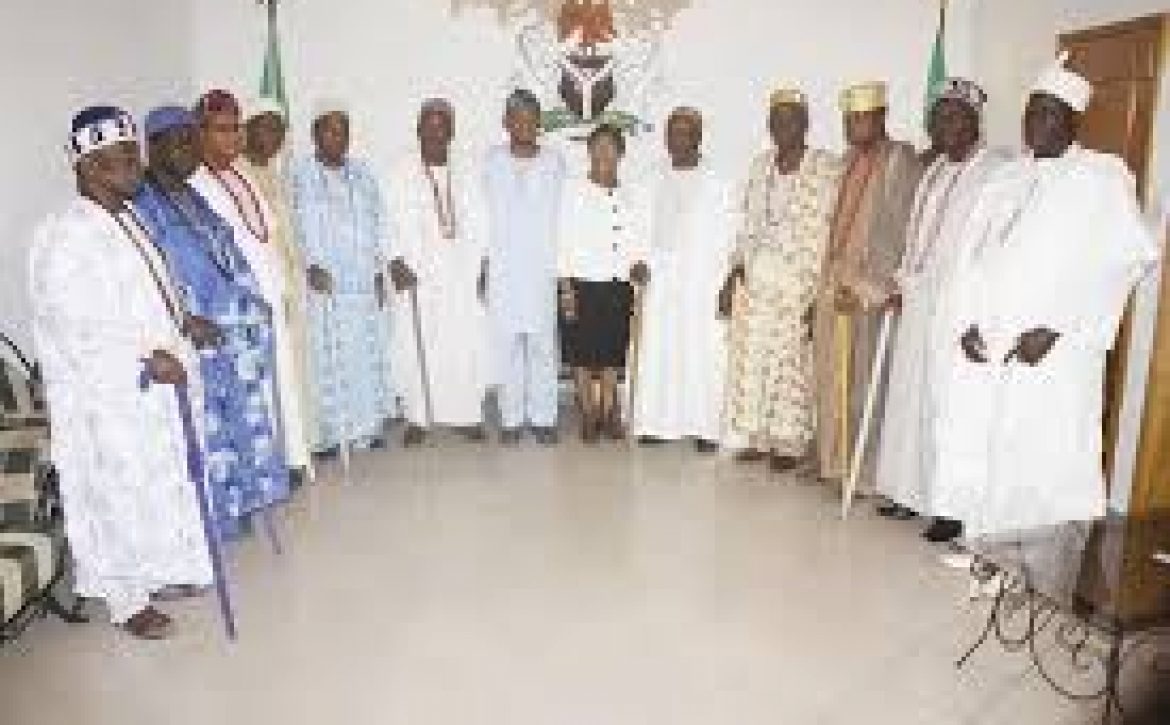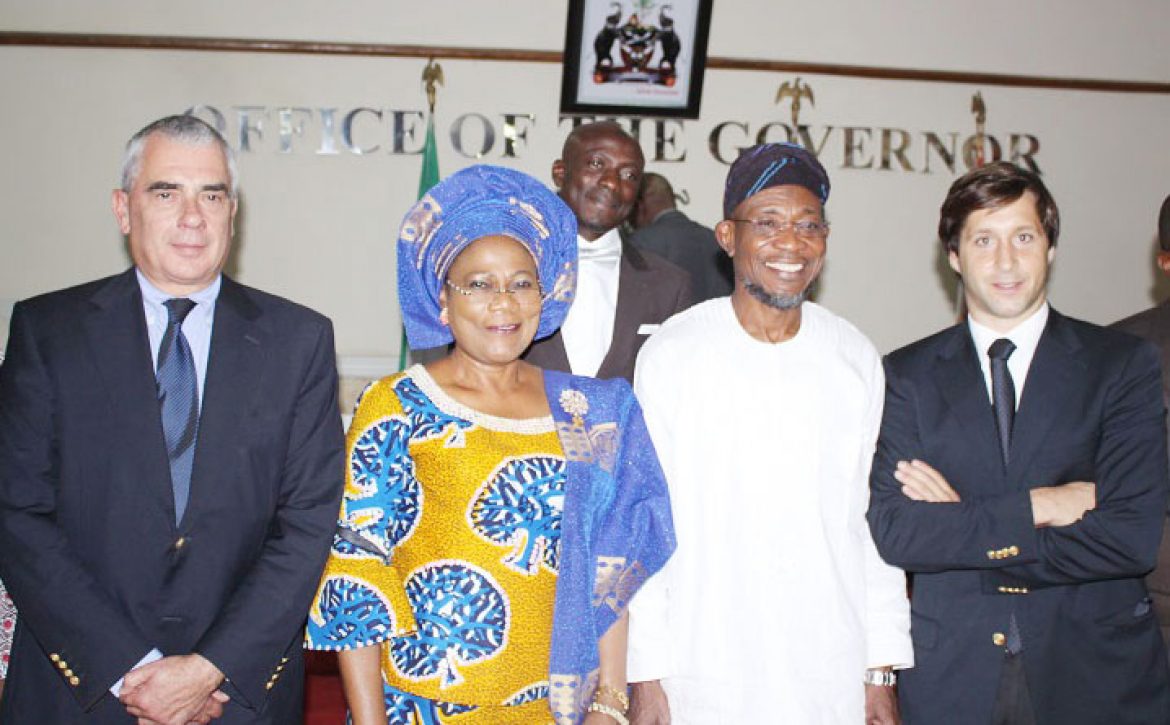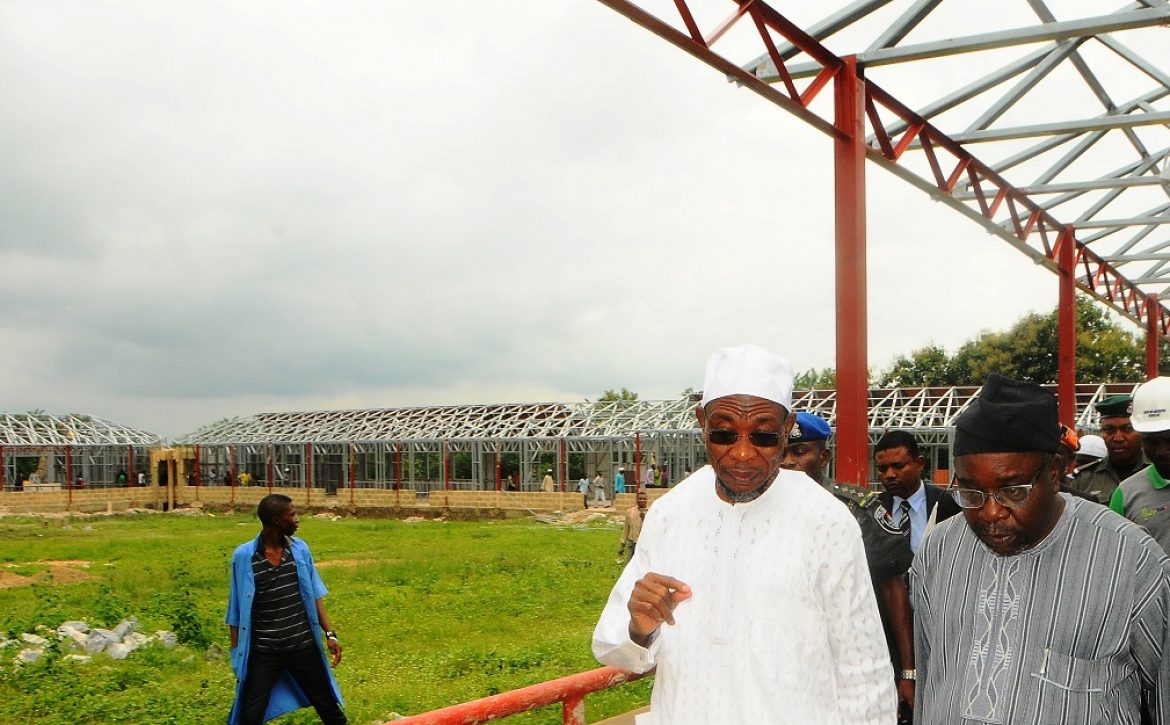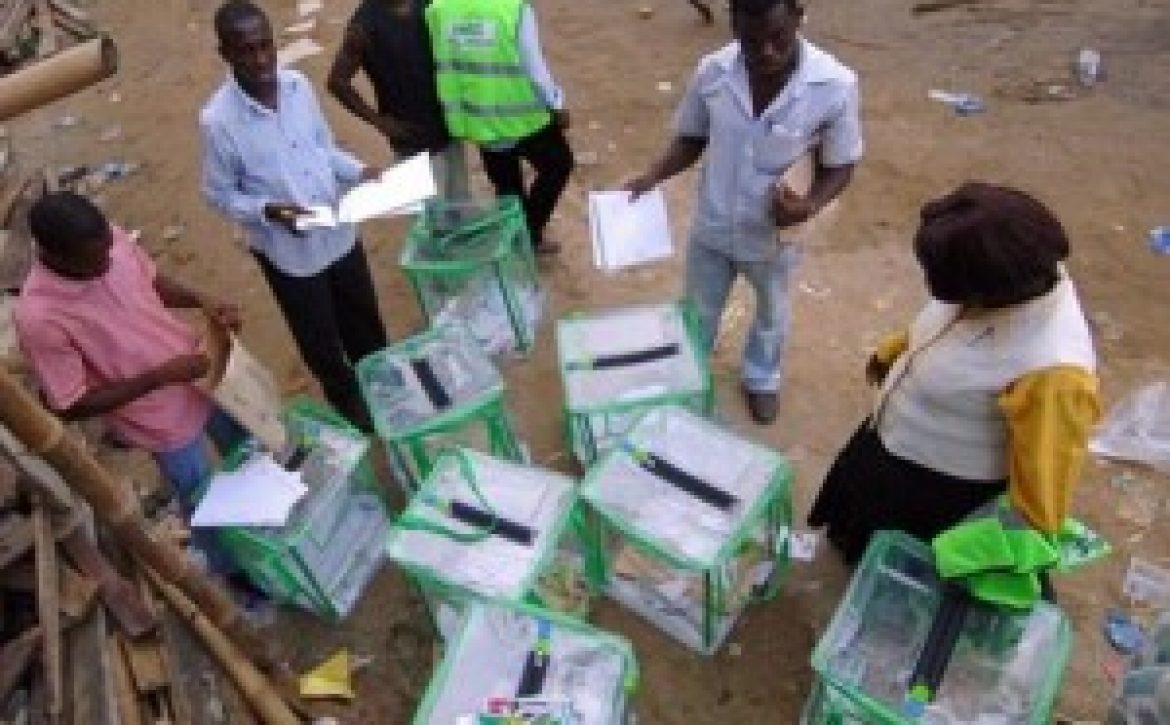 AN author, Chief Olaleye Falore, has urged the Osun State government not to relent in its efforts at raising the bar of education in the state.
AN author, Chief Olaleye Falore, has urged the Osun State government not to relent in its efforts at raising the bar of education in the state.
Falore, who is Chairman/Managing Director of Phaloray Book Works, made the appeal in Ilesa while speaking at the opening of the 80th anniversary celebration of Ilesa Grammar school.
He enjoined the alumni of the school, many of whom he described as notable personalities in the society, to support their alma mater by identifying with the school at all times.
At the grand finale of the anniversary today, distinguished old students of the school, including the General Overseer of the Redeemed Christian Church of God (RCCG), Pastor Enoch Adeboye; a former governor of Lagos State, Chief Lateef Jakande and a former Chief Justice of Nigeria (CJN), Justice Alfa Belgore, will be honoured.
TRIBUNE
Category: General
 Osun Forum has hailed the leadership style of Osun Governor State Rauf Adesoji Aregbesola, describing him as a man of vision and excellent disposition to service delivery.
Osun Forum has hailed the leadership style of Osun Governor State Rauf Adesoji Aregbesola, describing him as a man of vision and excellent disposition to service delivery.The president of the Forum, which is a non-partisan social group, Prof. Babatunde Adeleke gave the commendation at the forum’s Annual General Meeting held at the forum building in Osogbo.
According to the former Vice-chancellor of Ladoke Akintola University of Technology (LAUTECH, Ogbomosho, the administration of Governor Aregbesola has brought about relative Peace, which is the catalyst for the unimaginable transformational development taking place in all the nooks and cranny of the State.
“We also appreciate the Government of the State of Osun, under Aregbesola, for the massive infrastructural development in the state and the giant and innovative programmes of his government in education, i.e the school feeding programme and the brilliant and innovative Opon Imo.
Describing Aregbesola as a Governor that the people of Osun will forever remain appreciative to, for the new lease of life his administration has brought to them, Adeleke urged the Governor not to relent in his efforts to transform the state ‘to the state of our dream and the dream of the founding fathers of Osun Forum, who join others in fighting for the creation of the state’.
 The newly posted Federal Road Safety Commission (FRSC) Sector Commandant to the State, Mr. A. Hussein has paid the Internal Revenue Service a courtesy visit stressing the need to strengthen the already existing symbiotic relationship between FRSC and IRS.
The newly posted Federal Road Safety Commission (FRSC) Sector Commandant to the State, Mr. A. Hussein has paid the Internal Revenue Service a courtesy visit stressing the need to strengthen the already existing symbiotic relationship between FRSC and IRS.
While speaking at the meeting, the acting Chairman/CEO of Internal Revenue Service, Mr. Dayo Oyebanji appreciated the mutual understanding that has been existing between the two agencies in the aspect of discharging their statutory duties.
He then promised to render all the assistance at his disposal to make the FRSC fulfill their statutory duties, especially in the area of enforcing compliance to payment of road taxes and levies which is required for the growth of the State’s IGR.
In his response, the new FRSC sector Commandant, Mr. A. Hussein assured the Internal Revenue Service under the leadership of Mr. Dayo Oyebanji, of his readiness to combat fake number plates as well as fake drivers’ license that have been become rampant in most of the Sates in Nigeria.
He then said that, the deadline for the new plate number which has been slated for 30th of June, 2014 still remain intact and thereby solicited the support of Osun IRS in realizing this dream. He, however, reminded those that are yet to comply with the new plate number directive to quickly do so before the lapse of the duration.
OSUNNEWS
 The Osun Divisional Conference of Obas which comprise traditional rulers in Osun Central and Osun West Senatorial Districts have lauded the Governor of the State of Osun, Ogbeni Rauf Adesoji Aregbesola for making the state proud at a joint British parliament sitting he addressed recently.
The Osun Divisional Conference of Obas which comprise traditional rulers in Osun Central and Osun West Senatorial Districts have lauded the Governor of the State of Osun, Ogbeni Rauf Adesoji Aregbesola for making the state proud at a joint British parliament sitting he addressed recently.
This is contained in a release signed by the Aragbiji of Iragbiji who also doubles as the Secretary of the Body HRM Oba Rasheed Olabomi.
The Body of Traditional Rulers said Ogbeni Aregbesola remains the first Nigerian and African Governor to achieve such feat, expressing their delight that, for the British Parliament to have been very keen on taking a cue from the exemplary performance of Governor Aregbesola, the extent of having him as their tutor on the State of Osun School Feeding Programme christened O’Meal is a good testimonial of the superlative performances of the Governor. The Royal Fathers urged the good people of Osun to continue to support him so as to serve the state longer.
OSUNNEWS
 The Chairman, State of Osun House Committee on Finance and Appropriation, Hon. Kamil Oyedele has charged the State Ministry of Justice to “put its house in order” and get prepared to ensure that justice is done in all ramifications in this election year.
The Chairman, State of Osun House Committee on Finance and Appropriation, Hon. Kamil Oyedele has charged the State Ministry of Justice to “put its house in order” and get prepared to ensure that justice is done in all ramifications in this election year.
Hon. Oyedele also charged them to work harder and remove all obstacles causing delay of justice in the state.
The Chairman gave the charge while his committee hosted the Ministry of Justice at the on-going year 2014 Budget Defence Exercise on the floor of the State House of Assembly.
He said the Ministry of Justice has a crucial role to play in ensuring that justice prevails everywhere in this election year in the state, saying the society looks up to them as their last hope over election cases and other issues.
Fielding questions from members of the Finance and Appropriation Committee, the State Attorney General and Commissioner for Justice, Barrister Wale Afolabi thanked Governor Rauf Aregbesola for giving them the opportunity to employ 17 lawyers describing the employment as first of its kind in the history of the Ministry of Justice in the State, adding that the feat has helped the Ministry in the quick dispensation of Justice.
Speaking further, the Attorney General disclosed that over 1000 alternative resolution cases had been filed since the creation of the Department in 2011, while more than 200 out of it had been settled.
He said Governor Aregbesola has also approved the construction of court buildings in all the constituencies of the state, adding that the Governor also given approval for the supply of laptops to lawyers to assist them in the discharge of their duties.
The Commissioner for Justice said the State now has the best electronic law library in the country.
Others that took turns to defend their 2014 budget include; High Court of Justice, Judicial Service Commission and the Customary Court of Appeal.
OSUNNEWS
Photos from the introductory visit of the Founder, Mr Carlos Torres and Manager of RESUL Company to the Governor in his office, Abere, Osogbo on Thursday 07-02-2014

Governor State of Osun, Ogbeni Rauf Aregbesola; his deputy, Mrs. Titi Laoye-Tomori; Founder of RESUL Company, Mr Carlos Torres (left) and
Exort Manager of RESUL company, Mr Duarte Amaral, during the introduction of their company to the Governor in his office, Abere, Osogbo on Thursday 07-02-2014

 Chief Lai Oyeduntan is the Chairman, Osun Schools Infrastructure Development Committee (O’ SCHOOL). He spoke with Vanguard’s GBENGA OLARINOYE on the Osun School infrastructure development embarked upon by the Rauf Aregbesola administration among other issues. Excerpts:
Chief Lai Oyeduntan is the Chairman, Osun Schools Infrastructure Development Committee (O’ SCHOOL). He spoke with Vanguard’s GBENGA OLARINOYE on the Osun School infrastructure development embarked upon by the Rauf Aregbesola administration among other issues. Excerpts:
What informed the decision to embark on infrastructure development in the education sector?
The education sector was in a very deplorable, unacceptable and embarrassing condition and we still have left overs of the dilapidated, embarrassingly, dysfunctional, infrastructural elements in our schools. It would be irresponsible of any government not to have done something about the situation, but what to do became the issue.
When we came in, less than three per cent of Osun students sitting external examinations were considered matricable. By any yardstick or standard, this sector was dead. Look at the consequence of that particular sector- the pupils, the system, the environment. The teachers refused to teach and to impact knowledge. And for them to be effective, many things must come to play. Teachers must be interested and be encouraged to teach. Also, the pupil that finds himself in an unacceptable learning environment is unable to learn.
What was the state of the infrastructure before Aregbesola’s government intervention?
The environment in which pupils and students found themselves was horrible. The school blocks were dilapidated- no windows, leaking roofs, ceilings blown off, floors marked by potholes, schools that were not secure. When schools closed at 2pm, goats and undesirable elements took over and schools became den of hemp smokers and vagabonds.
This was the situation we met. The education conference was called within 100 days of Governor Rauf Aregbesola’s coming to the saddle because he had a plan for education sector and the recommendations from the summit were policy options that the government could adopt to revamp the sector.
We must recognise the importance of education, for without it, the society is doomed. And we are not talking about learning to read and write alone but the totality of the development of man – the mind and body.
So, what were the options that the government selected?
Government adopted to re-motivate and enhance the capacity of the teachers to teach and to encourage the pupils and students to learn because once the teaching and learning processes are enhanced, the sector will become more vibrant.
Government has recruited more teachers and is focused on the development and redevelopment of teachers in terms of capacity, training and retraining; government is boosting the morale of the teachers by ensuring that every teacher that is due for promotion is promoted and almost 7,000 primary school teachers were promoted in the last one year.
In fact, teaching job is being professionalized in Osun as the administration of the teachers, schools and basic education has been decentralized from one office to six, headed by the Permanent Secretary or Tutors-General who up until a few months ago, were school principals.
For pupils, government has been encouraged to rejuvenate learning as enrolment in elementary schools was dwindling because of poverty.
What is the cost implication to the government of these strides in the education sector?
Apart from the physical structure, it takes over N4bn every year to feed pupils ; N4bn that goes to the streets of Osun. We now have farmers doing poultry and beef and 3,300 Osun women are now engaged as official food vendors, it’s a booster to the economy.
Also, because of the large number of uniforms required, a garment industry came into being in Osun which is a booster to the economy, the students in the higher classes are being encouraged to take their destiny in their hands with the distribution of Opon Imo, a monumental innovation that has won accolades all over the world.
What are the major constraints your committee encountered?
Money. If we have money, it would have been a lot easier. Capacity to build is another. Our state is very poor and it would be irresponsible of any government to think that it can’t do much or there wasn’t much to do and people of Osun must be grateful to God for giving us a governor like this at this point in time. If the IGR alone can be boosted from N300m in a month to N1.6bn, it’s like miracle that has opened up the fund we have been able to use.
As we speak, virtually every incoming support into government is diverted to education. MDG is building four elementary schools and a middle school and we are looking at the possibility of another six immediately. I must commend our National Assembly members. They have pulled up their so called constituency projects together and they have put together N1.6bn and they are putting all that in education, building and renovating schools.
VANGUARD
 As the gubernatorial election approaches in the State of Osun, the State Commissioner of Police, Mrs Dorothy Gimba has called on members of the Federation of Informal Workers Organization of Nigeria (FIWON) and the entire citizens of the state on the need for them to conduct themselves peacefully before, during and after election.
As the gubernatorial election approaches in the State of Osun, the State Commissioner of Police, Mrs Dorothy Gimba has called on members of the Federation of Informal Workers Organization of Nigeria (FIWON) and the entire citizens of the state on the need for them to conduct themselves peacefully before, during and after election.
The police boss made the call during an advocacy visit paid to her by the members of FIWON in her office at State Police Command, Osogbo.
Mrs Gimba who identify peaceful co-existence among the citizens of the state as the panacea to growth and development in the state, noted that it has become imperative to imbibe the spirit of oneness so as to assist the state government in its efforts to maintain peace across the nooks and crannies of the state.
She advised, that as elections would come up August as slated by the Independent National Electoral Commission (INEC), FIWON should as a priority organize and educate their members on how to conduct themselves and their families peacefully before and during the elections, so that a free and fair election would be achieved.
Gimba added that necessary machinery had been put in motion to ensure there is free, fair and credible election in the state.
While stating her position on the present policy of the force as it relates to community policing, the Commissioner advised FIWON members to join local vigilante groups recognized by the command to help minimize crimes in the society.
Mrs Gimba who thanked the Federation for paying her a visit reiterated that her command would find it easy with FIWON as partner to record more success stories owing to the large numbers of informal workers’ organizations the federation control.
She praised FIWON leadership for been well organized and coordinated in their activities, saying with the federation strength, opening any door is easy, while government organizations and agency would appreciate forming a formidable partnership with the organization to promote security and peace of the state and Nigeria at large.
She assured the federation of her willingness to be supportive in any way it would be require, while she should be seen as part of the federation.
Earlier, the State Coordinator of FIWON Comrade Ibrahim Olayinka expressed gratitude to the command for responding to the federation invitation in the past and articulated what the Federation of informal workers’ organizations of Nigeria stands for, it mission, vision and the journey so far.
He solicited for the command cooperation in helping the federation in it activities and other ways of developmental collaborations.
BIOREPORTS
 The government of the State of Osun wishes to state that it is aware of reports of the situation at the Baptist High School Iwo, in Iwo Local Government Area of the State, by a section of the press.
The government of the State of Osun wishes to state that it is aware of reports of the situation at the Baptist High School Iwo, in Iwo Local Government Area of the State, by a section of the press.
Preliminary investigations reveal that 92 out of the 2,500 student population in that school were involved in a protest over the wearing of hijab.
In view of the development, government has therefore invited parents of the 92 students involved in the protest for a meeting at 4pm on Friday in Osogbo with a view to finding a lasting solution to the issues.
The government also wishes to state that a panel of inquiry is to be constituted in the immediate to investigate remote and immediate causes of the perennial disturbance at the Baptist High School, Iwo.
The panel is to comprise representatives of the relevant organisations such as the All Nigerian Conference of Principals of Schools (ANCOPS), Nigerian Union of Teachers (NUT), Parents Teachers Association and community leaders with the officials of the Ministry of Education.
It must be stated that the government recognises protest as a legitimate avenue for registering grievances in a democracy which must be peaceful and decent. However, it will not condone acts of indiscipline in any form from any quarters.
We restate our commitment to the total reform of the education sector just as we are determined to bring reforms to other aspects of our people’s lives in Osun.
Osun a Dara.
Signed:
Mr. Semiu Okanlawon
Director,
Bureau of Communications and Strategy
Office of the Governor,
Osogbo.
 The Independent National Electoral Commission (INEC) on Thursday met with the Osun State council Of Traditional Rulers to solicit support towards the forthcoming elections.
The Independent National Electoral Commission (INEC) on Thursday met with the Osun State council Of Traditional Rulers to solicit support towards the forthcoming elections.
At the meeting which held at the palace of the Ooni of Ife, Oba Okunade Sijuade, Olubuse II, traditional rulers raised several issues ranging from logistics to voter education and awareness to operations to ensure that the challenges of the past are adequately addressed for a successful conduct.
Although the Osun State governorship election is months away, the Commission in the state said that there was no better time to start preparations than now, and the meeting with the Osun State Council of Traditional Rulers as one of the major stakeholders was the first step.
The State Resident Electoral Commissioner, Rufus Akeju, while addressing the Royal fathers, pointed out the essence of the meeting, and assured them that the commission was determined to conduct a free and fair election, devoid of malpractice.


